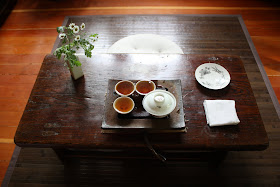
The name "Fo Shou" literally means "Buddha's Hands" because the shape of the citron can resemble the way images depict the Buddha's hands folded in prayer. Due to its shape the fruit is sometimes offered to Buddha in temples and is thought to be auspicious especially the fruit that looks most like Buddha's folded hands. The fu shou fruit is also used in traditional medicine in Asia where it is dried and sliced into fingers. Interestingly enough this Wuyi oolong not only carries the smells of fu shou fruit but also caries some of its taste and even some of its medicinal properties.
The dry leaves smell like the odour of fu shou fruit- light, airy, long, deep, fresh, starchy citron. Despite the leaves heavy look, they are quite light and fresh smelling. The water boils and, with the company of chrysanthemum flowers, one sits cross-legged on the ground and prepares this tea.
The first infusion emits a sour, malted odour and pours a yellow brown. It tastes light and refreshing with a mild-soapy fruity fo shou and papaya taste. The fruitiness of this tea is distinct right from the start and stretches out on the breath. The aftertaste is sweet with a starchy, sourdough feeling. The mouthfeel is sticky and pasty and is felt inside the lips and on the front of the tongue.
The second infusion is prepared. It reveals tastes with slight roasted notes that are very refreshing. A chalky, slippery papaya-grapefruit-fo shou citrus taste lights up the mouth, it then fades to finish more soapy but with a slight tangy taste. Relatively heavier roasted notes are the last to linger on the breath. The fo shou fruit is said to have flavours that are acidic and sour- this tea definitely shares some of these qualities but in a way that is not at all offensive. The cha qi of this tea feels very neutral, it pulls energy from the extremities and mobilizes it in the stomach. Its energy is stabilizing and harmonious to the midbody. The qi of fo shou is said to have similar actions especially that of harmonizing and strengthening the digestive middle jiao.
The third infusion is prepared and consumed. The initial taste is creamy, soapy and soft. Soon a substantial citrus quality dominates then fades back to creamy and soapy tastes once again. The roasted notes have all but gone. The aftertaste is subtle, creamy and with papaya, fo shou notes. The mouthfeel remains sticky and pasty but not overly thick. This tea is very refreshing although maintaining a very neutral thermal nature.
The fourth infusion has a slight slippery-roasted start, fruit notes have faded slightly and stabilize in the aftertaste. The fruity aftertaste is long. The mouthfeel develops a very soft sandy quality. This tea is refreshing and replenishing. The chaqi is moves throughout the body but is rooted in the digestive center. The movement is felt most in the chest and upper body, its affect is slightly relaxing. Interestingly, the qi of fo shou has some similar actions in the body especially to sooth and relax, to move qi, and to stabilize digestion.

In the fifth infusion more green tastes start to emerge with creamy more melon-citrus tones. The mouthfeel becomes more tight and thin. The aftertaste is lingers and caries this distinct melon-citrus taste for a long while.
The sixth and seventh infusions sees tastes that are still very noticeable but feel more full on the end and in the aftertaste. The initial taste is watery then turns almost woody. The fruity notes have migrated to the aftertaste, although they are still quite noticeable they start to loose weight. The melon-citrus aftertaste is long and enjoyable.

The last few infusions turn extremely watery but still share hints of woody notes as well as different fruity notes to enjoy.
Peace



Dear Matt,
ReplyDeleteYour gaiwan looks much more at home today, I am glad that the other teaware decided to give him a second chance.
I love this tea Fo' Sho, but what about Buddha's Sideburns?
Visit soon!
Brandon,
ReplyDeleteFo' Sho this tea be very tasty! Hahaha...
Sideburns didn't quite make the list of 32 physical features of the Great Man nor did it even make the 80 secondary characteristics of Buddha. See here: http://en.wikipedia.org/wiki/Physical_characteristics_of_the_Buddha
Was planning on a trip to NYC sometime this fall that fell through. It will probably be a long while before coming back... you're best off coming to Vancouver Island. ;)
Peace